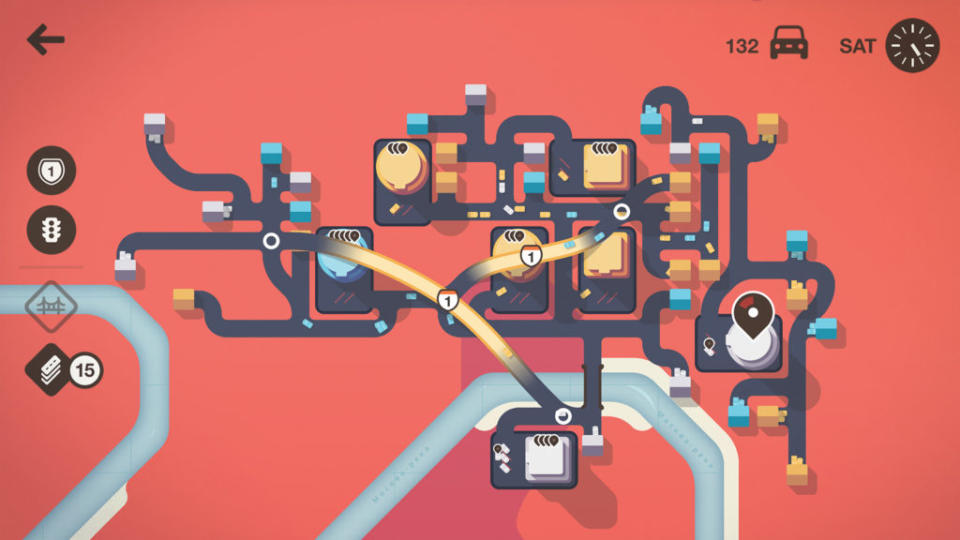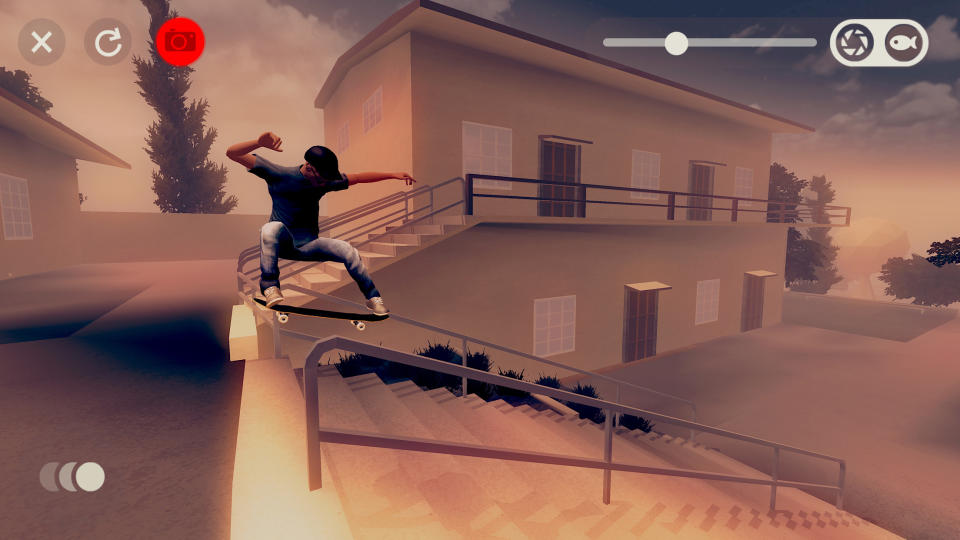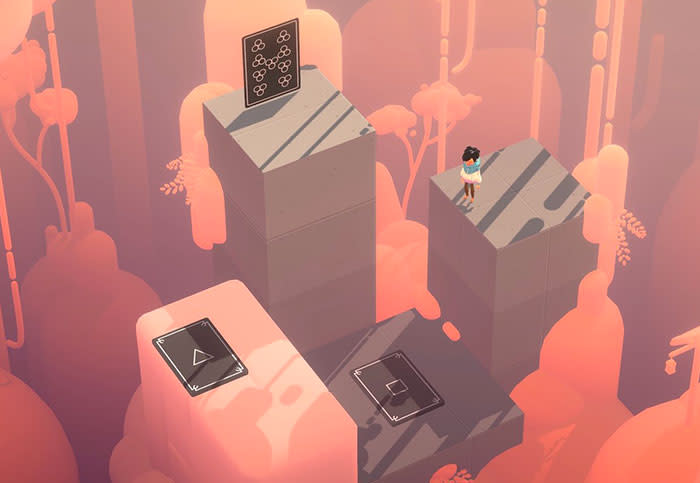A month on, Apple Arcade is too cheap to quit
There's a lot to love here.
It's been almost exactly a month since Apple Arcade launched. That means that a lot of free trials are about to expire, and it's time to decide: Is it actually worth your $5 a month? Like you, a number of Engadget editors have been testing out Arcade's various games in our spare time and, for us, the answer is a resounding "yes." The subscription gaming service has won us over in a very short time, including those that were initially on the fence.
We all have our own reasons, whether it's seeing Arcade as a potential solution to skeezy free-to-play mechanics, a tool to play titles across various devices or just a way to play some good games without paying a lot. Join four of us as we dig in a little deeper, and highlight some of our favorite games from the service along the way.

Mat Smith
Bureau Chief, UK
Sayonara Wild Hearts ticks all the hipster mores to ensure it'll become a keystone title for Apple Arcade, even if it's not an exclusive to iOS. As we collected our favorite games and thoughts on this new gaming service, I discovered I had played (and liked) more games than anyone else. By an uncomfortable margin. Still, I want to rave about Sayonara Wild Hearts.
Trying to distill the game down to a category, I'd call it a musical arcade racer where you're either avoiding objects or shooting antagonist bosses. You play as the dreamed-up alter ego of a woman dealing with heartbreak, battling characters based on Tarot cards — all done to an incredibly electro-pop soundtrack that I've already downloaded from Apple Music.
Please don't let that synopsis put you off, though. Behind the polish and cool is a short, satisfying game that begs for repeated plays. Your avatar will battle to restore balance in the cosmic universe and (eye-roll) her heart. She drives, parkours and flies around levels, each with a different song — some more memorable than others. SWH loves to subvert its arcade driving base, sometimes you'll think you're playing Rez, or cruising in an open-world game like GTA. Other times, you'll be timing button presses to battle your rivals in sword combat.
Parallel Universes is my stand-out favorite. It's a mid-game level where you battle twins that 'click' between realities, meaning you'll have to balance a ride through two different levels, avoiding deadly fans and drops on the way. It's hard, but satisfying. If you come undone by the same part of a level repeatedly, the cosmic voice of God or someone will ask if you want skip this tricky part. You really have nothing to lose by doing so. You can always replay the level once you've completed it. It's a forgiving game that just wants to be played to the end. The grand finale, and the accompanying medley, is another masterstroke that hit me in the feels.
The game is short but (bitter)sweet, and you can probably finish the whole thing in 90 minutes or so. The touch based controls can occasionally frustrate, too, especially if you're playing on an iPhone Max with a bigger screen. Some swipes will go unregistered and you won't be able to swerve enough in time. But I didn't care and you probably won't either. It's $13 on the Switch and PS4. Or you can pay $5 for just a month and play the whole thing. Apple Arcade could really be something that works.
Mini Motorways

There's something about transport sims that has always appealed to me, but I find the more involved ones like Transport Tycoon or Cities Skylines (sorry, 90 percent of that game is traffic management) utterly overwhelming. Mini Metro, then, with its stripped down interface and mild difficulty curve, was a breath of fresh air. I've been a fan since its original PC release, and have since purchased it for iOS and Switch as well.
While Mini Metro begins with a pair of subway stations, Mini Motorways starts with a building and a home. You have to draw a road to connect the two, so the car belonging to the home's residents can reach the building. Over time, more buildings and homes are added, with different colors, increasing the complexity of your road network. Where it differs from Metro is in its free-form nature -- cars will always take the shortest path to their destination, and you'll end up routing them in seemingly nonsensical ways. Not doing so inevitably leads to traffic jams, which will eventually be your downfall -- while the game is quite lenient, if too many cars take too long to reach a building, it's game over.
You'll get extra tools to improve your road system along the way, namely traffic lights, which I haven't made sense of yet, and highways, which are absolutely essential to bypass traffic black spots and keep things flowing. To a Brit living far away from the organized grids of many American cities, Mini Motorways is a shudderingly realistic transport simulator: The random nature of buildings popping up mimics how towns and our cities grew with no thought of how people would one day get around on wheels. Every game, you'll inevitably end up with some terrible lack-of-planning to circumvent, like the one I'm playing right now, where a purple building just appeared. On the exact opposite end of the map from my only purple houses. With the only path to it being a bridge that's always backed up. Joy.
Side note: It's been literally five years since I used it last, but Mini Motorways reminded me that Game Center is a thing. I've had fun comparing my high scores to a few ex-colleagues from The Verge. Whether they're aware of it or not, I will defeat them. AS

Aaron Souppouris
Executive Editor
I am, I'm told, a whale. I spent way too much money (like, four figures) collecting characters in Nintendo's free-to-play Fire Emblem Heroes game before coming to the extremely slow realization that I had a problem. That was my first real exposure to how people could want to loads of money on free-to-play games, but, thanks to the combination of having a teenaged son and the rise of Fortnite, it's not been my last.
While my family's Fortnite spend is largely under control thanks to the Battle Pass system, I've seen other free-to-play games get their hooks into my son multiple times. The most recent example is probably best told in two screenshots.
The first, from October 8th:

The second, from October 10th:

Cheers, Pewds.
Mobile free-to-play cash grabs are skewing the gaming industry and, at their worst, ruining lives. While games like Fortnite limit purchases to cosmetic items, in many mobile titles, micro-transactions are woven into the fabric of the game. They're necessary to play for longer than a few minutes, or to let you avoid a task designed to be boring and repetitive. In multiplayer games they can unlock characters and items that are more powerful, meaning you likely need to pay to reach your goal.
There are many ways to fix these mechanics, such as instituting a cap where, once you've spent a certain amount of money on micro-transactions, you own the game and all of the content therein. The problem is that these morally bankrupt methods earn companies a lot of money. Nintendo is estimated to have booked $500 million in revenues from Fire Emblem Heroes within two years of the game's release. For context, that's likely double the amount of Fire Emblem: Awakening, Fates and Three Houses, the series' three highest-selling games, combined.
Apple Arcade offers another solution: flood the market with high-quality games at a very low price. Developers are paid upfront to bring their games to Arcade, meaning they can turn a profit while making the games they want to make.
I was always going to subscribe to Apple Arcade -- I actively seek out "pay once" games, especially since the Fire Emblem debacle. What I didn't factor in was that a single Arcade subscription extends across your entire family. This means my son has dozens of titles to try instead of playing an endless stream of games designed solely to extract his (or, as is more frequently the case, my) money.
My only concern moving forward is one of sustainability. Apple has reportedly thrown $500 million at the project just to get it off the ground. While it has the profit margins to continue to do that indefinitely, Apple also has shareholders that, at some point, will start asking questions if Arcade doesn't turn into a revenue stream. This isn't an imminent issue -- Apple will definitely continue pushing hard on this for months and years to come -- but for Arcade and other similar services to have a chance at fixing mobile gaming, lots of people are going to have to subscribe.
Skate City

Alto's Odyssey developer Snowman isn't exactly the most punctual -- it's been almost three years since the company first announced Skate City. While it took much longer than planned for Snowman and Scandinavian design firm Agens to get the game out the door, it was worth the wait. Skate City manages to nail the essential skateboarding vibe of effortless cool through its visual design and music, and it's also the classic "easy to learn, hard to master" game.
The learning curve is just right -- it presents a host of different moves in a fashion that's pretty simple to pick up. But if you want to master all 90 of the main challenges in the game, you'll need precision, creativity, and a bit of luck. You'll also need to play most of those challenges a bunch of times to get a three-star rating, but the game rarely feels overly frustrating or unfair.
Skate City is probably best on the iPad, where's there's more room to pull off tricks, but it works well on the iPhone, too. And playing with a controller on the Mac or Apple TV is great -- basic tricks are quite easy, but there's still enough complexity in chaining multiple moves together that it doesn't feel too simplistic. It's not as complicated as the delightful OlliOlli games for the PS4, but it's far more involved than the Alto games. If you've ever enjoyed a skateboarding game in the past, Skate City is certainly worth a look. NI

Nathan Ingraham
Deputy Managing Editor
There are a lot of things I'm enjoying about Apple Arcade so far, but one of the more unexpected delights is how many of these games work wherever I want to play. I don't just mean that I can play on my phone any time I want, either. Apple and its developers' commitment to making Arcade games work on the iPhone, iPad, Mac and Apple TV means that I can be assured of playing these games in basically any context that I choose, be it on my phone on the subway, on my couch with an iPad or on my Mac when I'm supposed to be getting work done.
Mini Motorways from Dinosaur Polo Club is one of the best examples of this. Not only can I play on any device I choose, I can also pick up sessions regardless of where I started them. There's a "resume" option in the game's main menu that shows all games you currently have going on all your iCloud-enabled devices, which makes it easy to continue a game I started on my Mac on my iPad.
Naturally, not every Arcade game is going to work as well on the Mac as it does on an iPhone or iPad, and vice versa. A game like Skate City was built with touch control in mind, and it also translates well to a game controller — but don't try playing it with a keyboard, because it's going to be ugly. Mini Motorways, on the other hand, might be best played with a mouse and large display, though it's still quite playable on an iPhone. Some games aren't available at all on the Mac just yet, though Apple has said the catalog will eventually be identical across all of its devices.
It sounds kind of basic when you spell it out, and plenty of games have had universal versions that work on both the iPhone and iPad, but $5 a month to get a wide swath of quality games is a solid deal — the fact that I can play them on any Apple device I have nearby is just a nice added bonus. Of course, it's a boon for Apple, too, because anything that makes the Arcade easier to use means it's more likely you'll keep paying every month.
Where Cards Fall

Snowman actually launched two long-delayed games on Apple Arcade: Skate City, and the far more unconventional Where Cards Fall, which Snowman designed alongside The Game Band. Where Cards Fall mixes a totally unique puzzle mechanic with wordless but evocative scenes of the adolescent characters you guide through the game. It's an odd combination, but building different houses of cards to guide your avatar through a colorful and detailed world is extremely satisfying. If you enjoyed Monument Valley and its mysterious, impossible architecture puzzles, Where Cards Fall evokes a similar mood.
Like Skate City, Where Cards Fall works just fine on an iPhone but really sings on an iPad's larger display. There's a lot of detail in this world to see, and moving and adjusting various houses of cards is a lot easier with more screen real estate. But overall it's a great pick up and play wherever you are, regardless of what device you're using. There are tons of stages, and it works equally well if you want to just play a few puzzles while on the subway or dig in for an hour or two. NI

Nicole Lee
Senior Editor
I'm what you might call a hardcore casual gamer. I'm not into titles like Call of Duty or Fallout 4, but I really love fun little puzzle games, especially the kind that I can play on my phone, like Two Dots and Dr. Mario. Unfortunately, most modern mobile games are in the "free-to-play" category. They're free to download, but advancing through the game often means coughing up real-life money for in-game currency, which you can then use to buy upgrades. No, you don't need to buy them, but I often feel pressured to do so all the same.
On the other end of the spectrum are paid titles like Monument Valley and Old Man's Journey, which don't quite have as many levels, but have a deeper storytelling component. I absolutely adore these sorts of games, but I go through them so quickly -- often finishing the entire game in just an hour -- that they leave me wanting more.
Apple Arcade, however, presents me with a very compelling alternative. For just $5 a month, I have unlimited access to quality mobile games, many of which are as beautifully compelling as the aforementioned paid titles. And, of course, they don't have the trap of in-app purchases that free-to-play titles do. At last, I thought, this was the happy medium; the Goldlilocks of mobile gaming.
When I finally had access to Apple Arcade, I went ahead and downloaded the first puzzle game that looked interesting to me. It's called Possessions by Lucid Labs and it's touted as "a zen puzzle about perspective and life." In it, you're tasked with placing objects in a room by rotating the space around and changing your perspective. So, in one angle, it seems like a lamp is floating in mid-air. But if I rotate the scene appropriately, the lamp will "fit" into place next to the couch, and will no longer look like it's floating.
In the beginning, you only have to fit in three or four objects. In later levels, you have to fit even more. As you advance, the tasks get progressively more difficult -- in one scene, for example, you have to "assemble" a broken-up bicycle before it can be put in its place. All the while, I was impressed with the beautiful 3D illustrations along with the serene, blissful audio. As an option, you can also solve the puzzles using AR -- instead of just swiping at the screen, you'd physically move around the room to place the objects. As I usually play the game while sitting in the train where this is obviously not a good idea, I have not tried this mode out, but I think it's an interesting idea.
What I find especially intriguing is that, as I play through the levels of decorating this home, the game takes me through the ups and downs of the family that's living in it. At first, it seems that it is just a single person living there. But soon he finds a partner, and then they settle down. The house slowly goes from one with a minimalist aesthetic to one that's filled with children's toys. It gets harder to figure out what goes where. There's no dialog or description text at all, but I could still tell through playing this game that this person's life was getting more complicated -- perhaps a little too complicated.
I haven't finished Possessions just yet, but already I'm excited to play more. Not just to finish the puzzles, but also to find out what's next in the game's storyline. Will it end happily ever after? I guess I'll just have to pay another $5 this month to find out.
